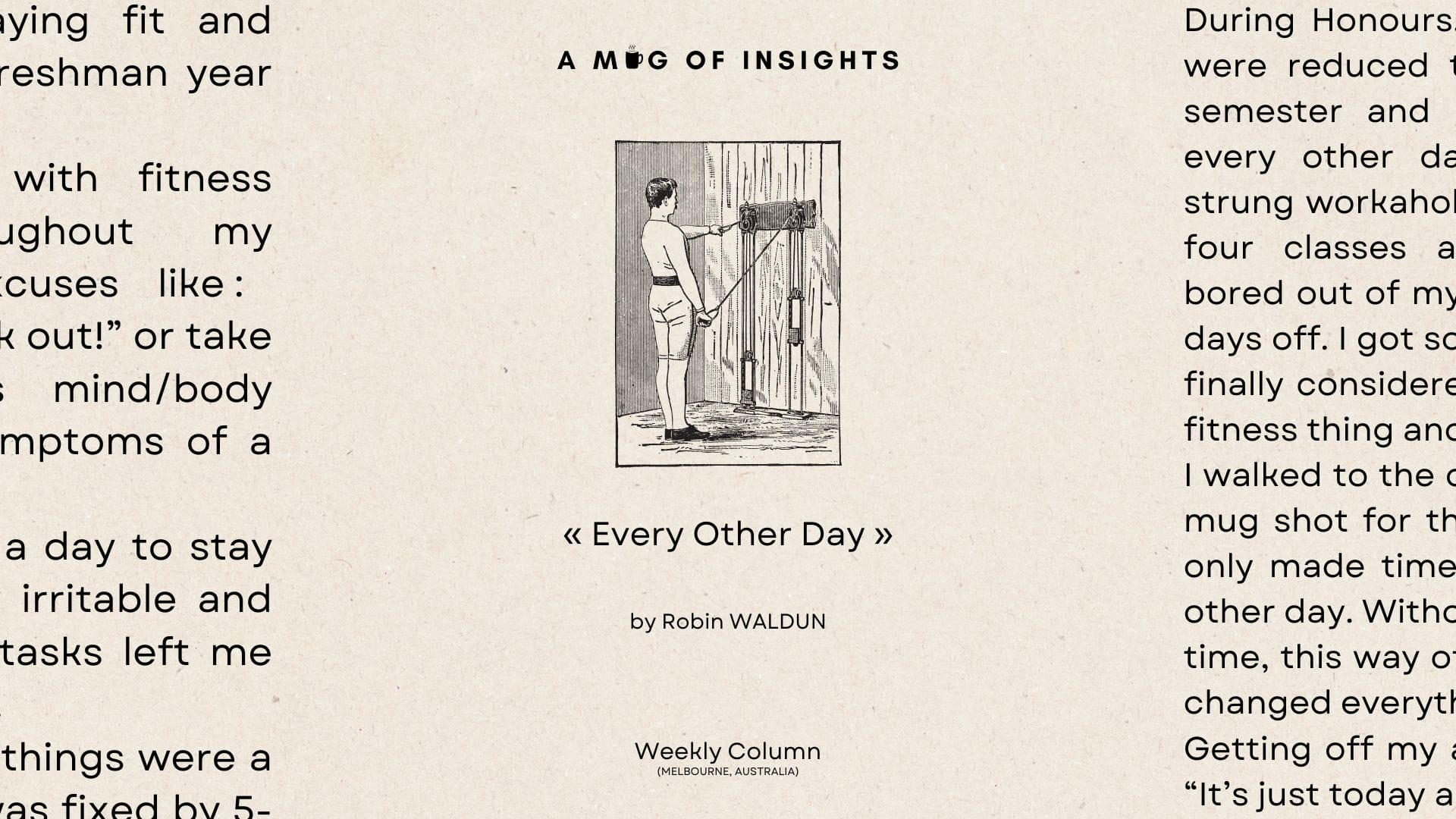Every Other Day: Use Laziness To Your Advantage

A Mug of Insights is 100% a reader-supported newsletter. While you’re here, consider signing up for a paid subscription for $5/month which will give you access to the full archive (posts are automatically archived after two months). Thank you for your contribution!
I’ve struggled with staying fit and healthy since my freshman year in university.
This bad relationship with fitness continued all throughout my undergrad. I’d use excuses like: “Brainy people don’t work out!” or take refuge in Descartes’s mind/body division to mask the symptoms of an out-of-whack lifestyle.
I consumed 4-5 coffees a day to stay awake. I was constantly irritable and anxious while everyday tasks left me passed out on the couch.
See, back in high school things were a lot easier. My schedule was fixed by 5-days a week on campus so averaging 4 days at the gym and eating healthy wasn’t too difficult. They slipped into the cracks of stable routines.
However, university posed new challenges: turbulent contact hours, Zoom lectures, and increased workload, which made finding time to take care of myself difficult.
Back then I might’ve chalked this lack of exercise up to all of the factors above, but in retrospect, the only problem was my misunderstanding of consistency. I thought: “If I’m not exercising every day like I did in high school, to hell with it!” and gave up on multiple attempts to restore healthy habits. But this all changed during my Honours year.
During Honours, my contact hours were reduced to two classes per semester and lectures happened every other day. So as a tight-strung workaholic used to four classes a semester, I was bored out of my mind during those days off. I got so bored in fact that I finally considered giving this whole fitness thing another crack.
I walked to the closest gym, got my mug shot for the membership and only made time for exercise every other day. Without knowing it at the time, this way of staying consistent changed everything.
Getting off my ass got a lot easier. “It’s just today and I’ll have a day off tomorrow.” I thought. The reward of “getting a day off” somehow removed all the resistance of exercise, and the exercise made sleeping in on my off days so much more rewarding. I’ve somehow tricked myself with the reward of being lazy.
After six months of doing this, I gained about 20 lbs of muscle and got a lot more energy throughout the day. Surprised by this progress, I started trying this principle on eating better. So on Tuesdays, Thursdays and Saturdays I let myself eat all kinds of shit they sold on campus, but cooked at home for all the other days. Again, my diet got better in a few months.
Then my thesis deadline started breathing down my neck. I turned around, gave it a little smirk and told it to use mouthwash because all deadlines stunk. I restricted my writing hours to Mondays, Wednesdays, and Fridays and before I knew it, I drafted the whole 18,000 words in two months.
And in all of these examples one rule stood out: if so many of us are working for the weekend anyway, why don’t we lean into the reward of a day off?
See, in our self-help-dominated therapy culture, we’re constantly trying to convince ourselves to LOVE THE DIFFICULT THINGS. But some things don’t deserve any love. Going to the gym is self-imposed torture (yes, the treadmill was originally invented as a torture machine) and getting down to work straight-up stinks even on a better day.
But, if we flip the narrative and seek out deliberate laziness instead, it’ll paradoxically put us on track with staying consistent. More importantly, it’ll break us out of the toxic cycle of overworking for the sake of it and invest more thought into how we’d like to spend our off days.
This is why when in doubt, try doing it every other day.
Until Next Week
Robin
Subscribe to my newsletter to get the latest updates and news




Member discussion